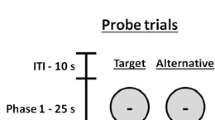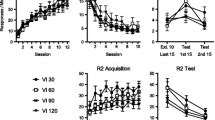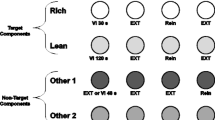Abstract
Four pigeons were studied under a resurgence procedure in which, in successive phases, 1) pecking the left response key (the target response) was reinforced while responding on the right response key (the alternative response) was not reinforced; 2) both responses were extinguished; 3) the alternative response was reinforced while the target response continued to be extinguished; and 4) the target response continued to be extinguished while unsignaled delays of reinforcement that progressively increased across several sessions were added to the alternative response key. As the delays progressively reduced alternative response rates and reinforcement rates, rates of pecking on the originally trained, but now extinguished, key-peck response recurred (resurged) in three of four subjects. The present findings suggest that resurgence is not restricted to conventional extinction where reinforcement is completely eliminated. They also suggest a means of controlling resurgence in the absence of access to the behavioral history that is the wellspring of that resurgence.


Similar content being viewed by others
References
Fleshler, M., & Hoffman, H. S. (1962). A progression for generating variable-interval schedules. Journal of the Experimental Analysis of Behavior, 5, 529–530.
Gleeson, S., & Lattal, K. A. (1987). Response–reinforcer relations and the maintenance of behavior. Journal of the Experimental Analysis of Behavior, 48, 383–393.
Hagopian, L. P., Fisher, W. W., Sullivan, M. T., Acquisto, J., & LeBlanc, L. A. (1998). Effectiveness of functional communication training with and without extinction and punishment: A summary of 21 inpatient cases. Journal of Applied Behavior Analysis, 31, 221–235.
Hagopian, L. P., Boelter, E. W., & Jarmolowicz, D. P. (2011). Reinforcement schedule-thinning following functional communication training: Review and recommendations. Behavior Analysis in Practice, 4, 4–16.
Hanley, G. P., Iwata, B. A., & Thompson, R. H. (2001). Reinforcement schedule-thinning following treatment with functional communication training. Journal of Applied Behavior Analysis, 34, 17–38.
Jarmolowicz, D. P., & Lattal, K. A. (2013). Delayed reinforcement and fixed-ratio performance. Journal of the Experimental Analysis of Behavior, 100, 370–395.
Lieving, G. A., & Lattal, K. A. (2003). Recency, repeatability, and reinforcer retrenchment: an experimental analysis of resurgence. Journal of the Experimental Analysis of Behavior, 80, 217–233.
Lieving, G. A., Hagopian, L. G., Long, E. S., & O’Conner, J. (2004). Response-class hierarchies and resurgence of severe problem behavior. The Psychological Record, 54, 621–634.
Marstellar, T., & St. Peter, C. C. (2012). Resurgence during treatment challenges. Mexican Journal of Behavior Analysis, 38, 7–23.
MED Associates, Inc. & Tatham, T.A. (1991). MED-PC Medstate notation. East Fairfield: MED Associates, Inc.
Podlesnik, C. A., Jimenez-Gomez, C., & Shahan, T. A. (2006). Resurgence of alcohol seeking produced by discontinuing non-drug reinforcement as an animal model of drug relapse. Behavioural Pharmacology, 17, 369–374.
Wilson, K. G., & Hayes, S. C. (1996). Resurgence of derived stimulus relations. Journal of the Experimental Analysis of Behavior, 66, 267–281.
Acknowledgments
The authors thank Sally Huskinson for her help conducting this study.
Author information
Authors and Affiliations
Corresponding author
Rights and permissions
About this article
Cite this article
Jarmolowicz, D.P., Lattal, K.A. Resurgence Under Delayed Reinforcement. Psychol Rec 64, 189–193 (2014). https://doi.org/10.1007/s40732-014-0040-0
Published:
Issue Date:
DOI: https://doi.org/10.1007/s40732-014-0040-0




